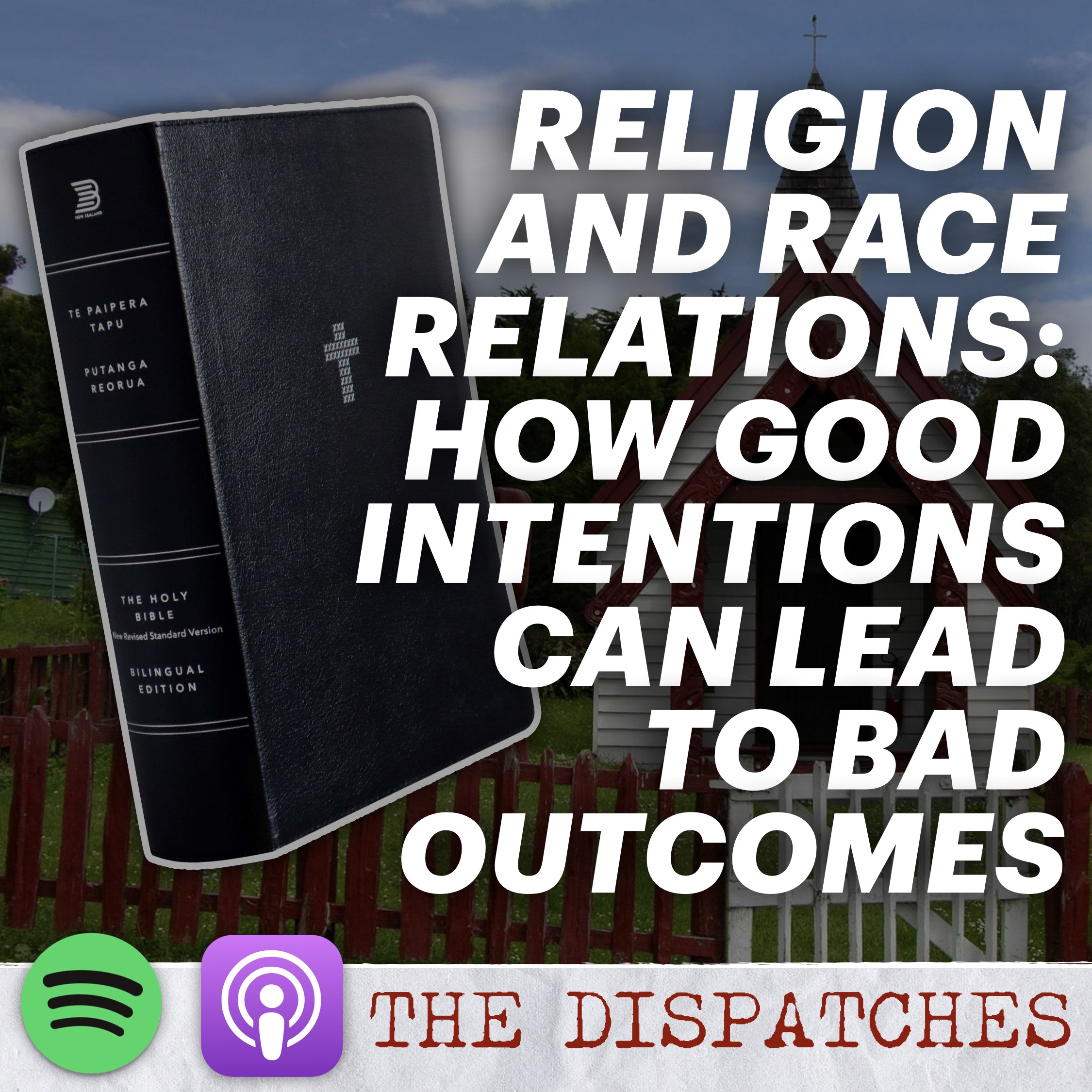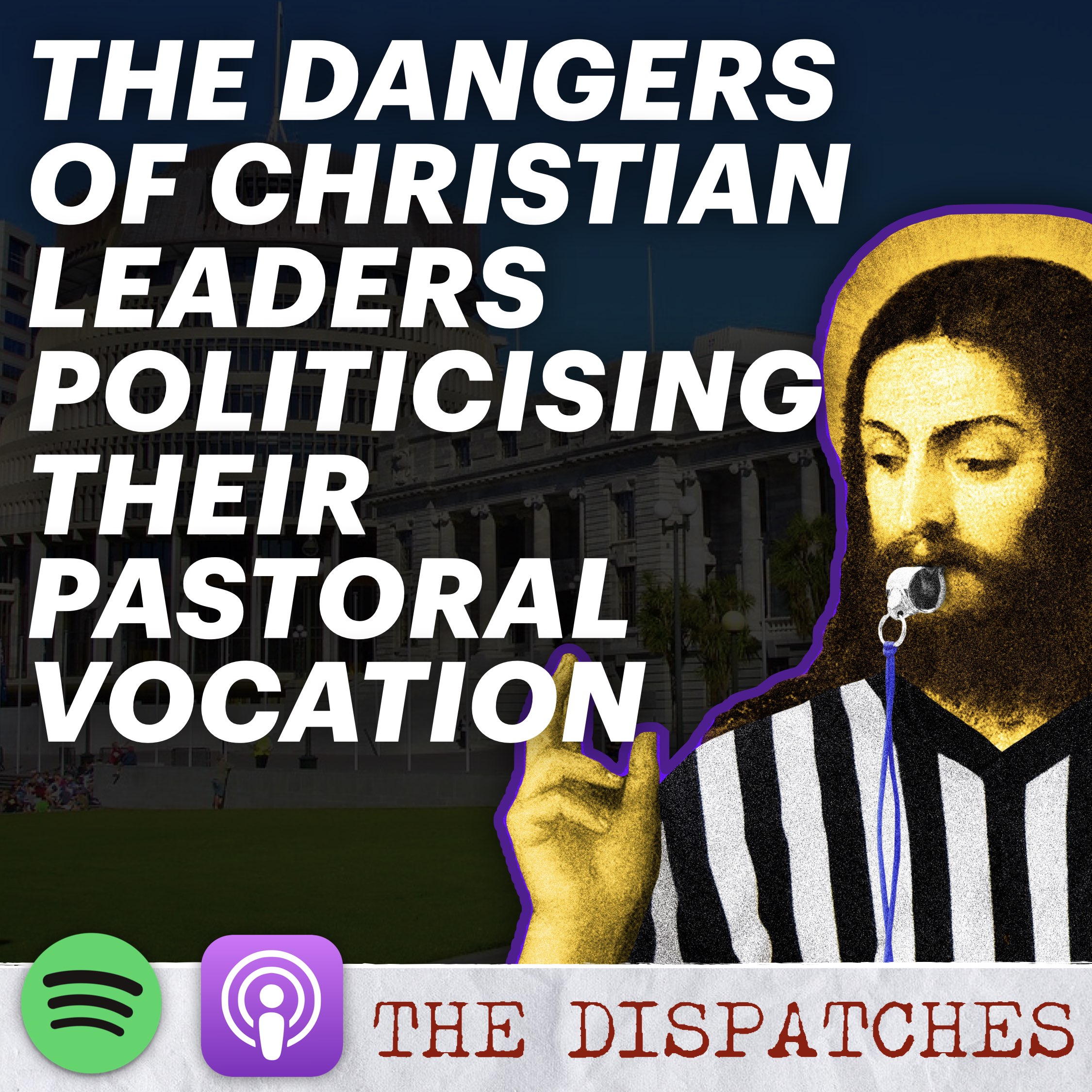[00:00:04] Hi, my name is Brendan Malone and you're listening to the dispatches, the podcast that strives to cut through all the noise in order to challenge the popular narratives of the day with some good old fashioned contrarian thinking. You might not always agree, but at least you'll be taking a deeper look at the world around you.
[00:00:22] Hi everybody. Welcome along to the Friday Freebie edition of the Dispatches podcast. My name is Brendan Malone. It is great to be back with you again. And today's topic of conversation is religion and race relations, how good intentions can lead to bad outcomes. Before I dive into that, though, if you're new here and you're not a subscriber to the podcast, why not subscribe on whatever platform you're listening on right now? If you are able to and you've heard a few episodes and you like what you're hearing, please give us a review or a few stars if your platform allows you to do that. And last but not least, we publish a patrons only episode of the Dispatches podcast every single day of the week, Monday through Friday. And so if you want to get a day daily dose of commentary from the Dispatchers podcast, go to patreon.com leftfootmedia. The link is in today's show notes and become a five dollar monthly patron. A huge thank you to all of our patrons. It's thanks to you guys that we're able to keep putting out this content. Alrighty, so let's jump into today's topic of conversation, religion and race relations, how good intentions can lead to bad outcomes, and I'm going to read to you from this article. It will explain the situation, and then I'm going to share my thoughts. Last year, Bible Society New Zealand released a 109 page booklet with ten Bible passages published in a contemporary Mori translation. For the first time, the version used the names of Attua Mori, or the Mori gods and deities in place of words like heaven, earth, land and sea. Genesis one one, for example, says that in the beginning, God made Ranginui sky father and papatuanuku earth mother instead of rangi and whenua, respectively. The changes, meant to appeal to younger Mori, stirred debate. While some readers praised the changes, the terms are more relatable, wrote one respondent in a Bible Society New Zealand survey. Many, including Mori theologians and church leaders, decried the use of attua mori in the scriptures as twisted and blasphemous. The aim of publishing hitimatanga a beginning was not to present a final translation, but to offer a draft for feedback, said Clare Knowles, translation coordinator at Bible Society New Zealand. Publishing these passages was part of an effort that began in 2008 to retranslate the entire Bible into Mori in todays language. While Mori speakers in New Zealand have a Bible translation in their language, it was last revisited in 1952. The most recent edition in 2012, mainly focused on reformatting the text with updated paragraphs, spelling and punctuation. But the content has largely remained the same since missionaries first translated the Bible into Mori in the 19th century. Imagine if the only english translation we had was the King James Version. This is a bit like the situation with the Mori Bible, Knowles wrote in an article promoting hitimatanga. So just to summarise, what you've got is the Bible Society of New Zealand doing something that I think is very laudable. Here they are trying to craft a new Mori translation of the Bible, an updated mori translation of the Bible, and they have gathered together a group of people to help with the translation process. And then they have released some of these texts for feedback and in some versions they have decided to utilize the names of pagan gods and deities in the christian scriptures to describe various things. Christianity was formally introduced to the Mori people in New Zealand in 1814 by Samuel Marsden, an anglican minister who travelled from Sydney at the invitation of the Mori leader Ruatara before the establishment of a mission in Ruatara's home village. Mori beliefs centred around a pantheon of gods and spiritual forces. As Mori embraced Christianity in large numbers, they moved away from a complex spiritual and social world, mediated by Tohunga priests and tikanga customs. And so basically what they're saying here is that for those who maybe are listening from outside of New Zealand, the pre christian world of Moridom was pagan and it had a pagan spirituality, it had a pantheon of pagan gods. And so you can see the issue here. The issue is they are now trying to or in some of these texts, some people involved in the translation process have proposed that they should actually bring the names of pagan deities, which would therefore mean actually inserting pagan spirituality into the christian scriptures. J. Martinga, executive director of the World Evangelical Alliance's mission commission, noted that the earliest Mori Christians saw Attua Mori not as mere symbolism, but as gods who had real power. In other words, they actually believed in the pagan spirituality that shaped their lives. So reviving knowledge of spiritual deities flippantly, without the means to navigate the relationship as the tohanga did, is spiritually ignorant and risky, he said. Matua Hakiyah, who served on the translation committee of the 2012 reformatted edition of the Mori Bible was mortified when he read Genesis one and two in Hitimatanga. Here was the word of God based on hebrew culture. And here we are dragging Mori words into the hebrew and greek words. He said, no, no, no, you're tampering, interfering with their worldviews. And that's a really important point. We'll come back to that when I share my thoughts on this. Author and historian Keith Newman, who moderated several online debates on his facebook page regarding he Timatanga, shared similar concerns and I've had the privilege of speaking at a couple of conferences with Keith Newman. Very good man. He's written a couple of important books about Mori and christian history in New Zealand. He said that although Mori creation legends and Atua Mori can stand on their own for individual comparison and metaphorical unpacking, they should never be included as if they are the same thing. Otherwise it would leave readers with a recipe for confusion. Debates about hitimatanga also took place in formal gatherings. In June 2023, Mori Christians took part in Ahui, a meeting conducted with Mori customs to discuss the translation. Six months later, the Aatroa New Zealand association of Biblical Studies devoted a full day of its annual conference to discussing the contents and the issues raised by He Timatanga, with proceedings to be published in a special issue of religious journal. Tihuacamalbn, the translator responsible for Genesis one one and Hitimatanga explained the choice of words. All I'm saying in the translation is how I think mori see it. Ranginui is the name given to the sky, the earth is papatuanuku. I cannot see why we shouldn't use this terminology. It's very common with the kids in the Khangario generation or children raised in full immersion mori schools in a Bible society New Zealand written statement, Knowles emphasised that the translations in Hitimatanga were offered in a spirit of generosity, recognizing the need for a new Mori translation that speaks to younger generations. And I think that is a very laudable aim, by the way. There's actually nothing wrong with it. They are trying to actually bring the scriptures to a wider audience and that is a very, very laudable thing for christians to do. The spirited discussions around he Timatanga have occurred amid wider societal shifts in attitudes regarding indigenous language and culture in New Zealand. The revitalisation has led to significant shifts in the Mori language, with thousands of new words officially documented since the 1980s, it has also caused an increased emphasis on Mori spirituality. While this has historically included the use of christian prayers, in recent years Mori have been increasingly drawn towards the use of pre christian mori folklore. So in other words, the use of pagan spirituality from Mori culture prior to Christianity. For instance, in 2022, when the New Zealand government made Mazariki a public holiday to celebrate the mori new year, official resources outlined ceremonies that involved honouring the deceased and presenting food offerings to the stars in the Pleiades star cluster. Now, you've already heard me talk about this if you're a longtime listener to this podcast, and I did a whole episode last year, and in fact I think one the year before too, talking about Matariki and explaining why Matariki is not actually christian spirituality or consistent with christian spirituality. The official version of Matariki, the actual ceremonies, the various liturgical resources that have been released by the New Zealand state, are actually pagan in nature. They are not the same as Christianity. And they're not two things that you can actually intermingle as christians. We don't worship pagan deities, we don't involve ourselves in pagan liturgy. And so I think it's really, really important to understand that it is in this changing culture that christians in New Zealand are searching for ways to engage Mori speakers with the Bible. Wayne Tikaua, a Mori theologian from the University of Otago and part of the wider reference group for Bible Society New Zealand, noted that many younger Mori in his theology classes favoured bringing Atua Mori into the Bible as it validated their identity and worldview. Essentially, Genesis one two is a Middle eastern creation story, he said. We didn't want to try and match the two stories, we just wanted them to come into conversation with each other. And there's a big problem with that approach. I'll talk about the actual philosophical approach that's being taken here in just a second when I share my thoughts. But there's something I think that is very reductionist and wrong about looking at the christian scriptures and seeing only the actual historical context in which they were written. And when you do that, you are failing to recognise that that is not the only sense in which christians understand and read scripture, and that the more important theological sense of scripture, the truths that scripture intends to teach us about salvation, about who God is, about who we are, about what is moral and what is not, etcetera, that that sense of scripture is universal, it is timeless, it is for all people of all ages. And so to look at this and say, well, it's a Middle eastern creation story and therefore it's not relevant to me, is a failure to actually read the fullness of what christian scripture is and how it's actually meant to be read. Hakiha, who grew up in a community fully immersed in Mori language and culture, noted that as his children and grandchildren learn Mori in school, he is concerned that their teachers are teaching Mori gods to them. Unlike the older generation, our younger mori are saying there's no place for Christianity, thus the need for a new Bible translation. And I think what he's warning about there is really, really important, and this is sort of something that I really want to talk about in just a second. Knowles acknowledged some of the challenges ahead for the Mori Bible translation project. The pool of christians who are fluent in both Mori and biblical languages is extremely small. So in other words, they've got to be really careful here. In addition, those with time to join the committee are often retired and outside the target audience of young adults. In contrast, Knowles observed that younger Mori, proficient in their native language, often disqualified themselves out of reverence for their elders. Now, I find that interesting, that they are looking at a target audience of young adults with this translation. I'm not sure why that is the case. Surely if you're going to translate into another language and the fact that the scriptures are universal for all people of all times and all ages, then I'm not sure why you would only be targeting one particular group within that particular demographic who speak that language that you're translating the scriptures into. For future generations of Mori, Hakiyah hopes that the Bible will be made accessible and acceptable from the cradle to the grave. This will require more than just a new Bible translation, but concordances and dictionaries as well as Bible literacy and engagement efforts, and that's excellent. I think that's a really, really important endeavour where I think perhaps a bit more focus should actually be given. He sees Mori as having a positive role in leading the way for other indigenous peoples around the world to revive their language and culture. Yet when translating God's word, hakiha calls for christians to remember waiho te au maori, ki ti ao maori, waiho te au kara, itiana kiti ao kara, or in English, leave the mori world to the Mori world. Leave the christian world to the christian world. And that is a really, really important final point that I want to jump off of into my thoughts about all of this. It seems to me that what's going on here, certainly in some cases, not all quite clearly, because there are Mori theologians and church leaders who are pushing back against this and who are rightly saying, hey, this is not how christian scripture should be treated. But in some cases here, I think there is a failure to understand what authentic relevance actually entails like truth and goodness. And we're talking here about the truth and goodness of the christian scriptures. They are timeless and so it's not like all of a sudden you have to keep reinventing them. Yes, you might need to actually adjust translations because the cultural language has shifted. So the words that people are actually using in culture have shifted. And so you might actually need to make some changes in order to allow for a more readable version of the text, but you should not be changing the content at all. And charity, I think, is also very essential in all of this. It's about how you engage with the culture. The, I think it's more about your disposition as an evangelist, as a proclaimer of the christian gospel than it necessarily is about the actual language of the text that you are using. Now don't get me wrong, the Mori text I think is a good thing and an updated translation, very laudable aim. But what I'm saying here is that even if you have a very good translated text available, but you don't actually engage well with the culture, and you are not a faithful ambassador of Christianity in your culture, then even the best translation of the text is not really going to help you much. You're not going to be relevant to those people if you are not in a genuine relationship and dialogue with those people. And so relevance is not actually about popularity, it's not about imitating cultural fads. And it seems to me that that's the mistake that some people are making here. They think that if we take current cultural trends and we just insert them into the scriptures, that will suddenly make the scriptures relevant. That's not how that actually works. Relevance is not about making your traditional, mimic the culture of the people you are trying to reach. It's about an authentic dialogue, it's about a genuine engagement. And it is about being very clear and presenting the truth of the christian tradition. That's how you actually make it relevant. I think also there is a failure to understand the vital importance of safeguarding tradition and scripture. The christian scriptures we're talking about here is the fundamental written manifestation of the christian tradition. 2000 years of christian heritage. The fundamental written manifestation of that heritage are our christian scriptures. And so the greatest respect that we can show to the scriptures is not seeking to impose ourselves upon them, but instead to receive them with reverence. And so I can definitely smell the odor of classical liberalism here. The failure to recognise the communal dimension and the harms to all of this when you prioritise individualism and you prioritise personal identity beliefs ahead of the actual sacred tradition and the written manifestation of that sacred christian tradition. Like we heard in this article, there are people here suggesting that in actual fact, we should make the scriptures fit people's own subjectivist personal beliefs about themselves and the world. No, that is not how we should approach our sacred tradition at all. Instead, we should show it the highest of reverence, and we should approach it with humility and recognise that we need to actually understand it. This is a particularly modern mindset. It comes from liberalism. It's a way of thinking about ourselves and the world around us. And unfortunately, we tend to think of ourselves now as autonomous, self choosing individuals. And we are subjectivists. We reason our own way through the world, and we decide what is true for ourselves and what is not. But that is not how you actually show regard for tradition, and especially when you're dealing with a sacred tradition and something as sacred as the christian scriptures. The call is for us to approach it with humility and reverence, not with a subjectivist, reconstructionist sort of mindset. The irony here, of course, is that moridom would never tolerate this kind of approach with their own sacred traditions, and nor should they. You actually should respect and safeguard tradition. And the way to do that is to receive it, not to try and constantly reinvent it in your own image. And rightly so. Moridim would say, no, you don't do that with Mori tradition. And so we shouldn't be doing it here with christian tradition either. Ironically as well, this kind of approach actually makes the christian scriptures less universal. The content of christian scriptures is for all people of all times and all places. But when you do what some people are proposing here, this actually both implies that this is not the case, because obviously the content needs to be changed. Otherwise you are not including everyone. It's not just a matter of translating, but it's actually changing the substance of what is being said. So not the words used in a particular ethnic context, a particular dialect to explain the substance of scripture, but actually changing the substance itself. And then these changes actually also make the content of the scriptures exclusive to a particular time and place. So they're really talking about here reshaping scripture based on a current cultural trend within Moridim. But that current cultural trend might not be the case in 20 or 30 years, and all of a sudden, this scriptural translation has become exclusive just to that particular time and place. And not just that, but what if you're someone outside of Moridom who maybe could speak Mori, and who reads these scriptures all of a sudden, these scriptures are not actually universal to you anymore. They are exclusive to a particular cultural, pre christian, pagan set of beliefs, and in this particular regard, the actual substance of what appears on the page. So a language translation of the scriptures doesn't actually do this. And that's a good thing. It's totally fine to translate the scriptures into other language. That's a good thing. It helps the universal truth of the content of scripture to really flourish and come alive and be expanded to even more and more peoples. And that's actually a good thing. But when you go trying to change the content, the substance of what is actually being said, not just the words used to express that content, that substance, then you've actually got a problem. So in conclusion, I would say this, that the translation of the scriptures in te reo mori is a worthy and important endeavour, and that's something very praiseworthy and we should all support. I think, however, that translation must provide a faithful rendering of the content and context of the christian scriptures. Otherwise you actually have something that is no longer good and true taking place. So inserting the names of Mori pagan gods into the christian scriptures isn't just about words. What you are actually doing there is you are now importing completely different and false worldviews into the truth of christian scripture. I know this might get lost on modern liberal minds, but this is so fundamentally important.
[00:20:41] The ancients understood this really, really well, and it's something that we've lost sight of in a lot of modern Christendom. We've failed to recognize that the words we use are actually world building because we have lost sight of the sacramental nature of the world. We generally, in the west, don't operate under a sacramental worldview anymore. And as a result, we fail to recognize just how important and how powerful words actually are. They speak to invisible realities and they actually speak to what we believe they really are important. And so when you start just inserting the names of pagan deities into the christian scriptures, you are now bringing a completely different worldview, a completely different belief about who God is and who God is not, and what the world is and what it is not. We don't believe in a pantheon of gods. There aren't many deities. There is only one God who is Triuna, nature, Father, Son and Holy Spirit. And he creates not out of some act of spiritual reproduction, or some capricious act of the gods, or some spiteful bit between gods like you often saw within pagan deities. But he creates out of love. The creation of the world is external to himself. He doesn't exist in creation as a deity. He is external to his creation. He creates out of love, because everything he creates is created so that he can be in a loving relationship with us, his human creations. And so this is really quite profound. There's a whole worldview in this that really, really matters. And when you go inserting other things in there, you are now inserting competing visions of reality into the christian scriptures, which, as I said earlier, is the most important written manifestation of our sacred christian tradition. And if the aim is to make the truth of Christianity more accessible to the Mori people, this is not the way to do that, because all you end up doing is concealing the truth of the sacred christian tradition. And thus the true content and substance and truth of the christian scriptures is actually now made less accessible to people because it's cloaked behind the names of pagan deities that aren't actually christian, nor any part of the actual content of christian scripture. So ironically, you end up doing the very thing you are claiming that you don't want to do. You're not actually revealing the fullness of the christian scriptures, you're actually starting to cloak it now in something that it is not. As I said, it's a very laudable project, but let's hope and pray that the relevant corrections are made so that we end up with a mori translation of the scriptures which is faithful to the actual substance and truth of our sacred christian tradition. Thanks for tuning in. Don't forget, live by goodness, truth and beauty, not by lies. And I'll see you next time on the dispatches.
[00:23:45] The Dispatchers podcast is a production of Leftfoot media. If you enjoyed this show, then please help us to ensure that more of this great content keeps getting made by becoming a patron of our
[email protected].
[00:23:57] leftfootmedia link in the show notes thanks for listening. See you next time on the dispatches.






